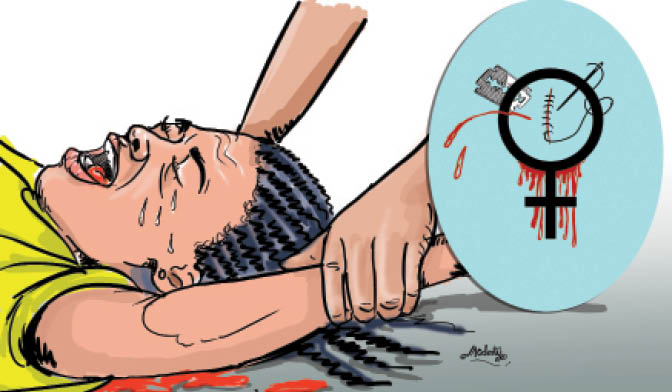Female Genital Mutilation (FGM) is practised in Nigeria and some other countries despite being widely recognised as a harmful traditional practice.
The practice involves the partial or total removal of the external female genitalia or other injuries to the female genital organs for non-medical reasons. It is recognized internationally as a violation of the human rights of girls and women.
- Russia/Ukraine war contributing to Nigeria’s food insecurity
- Niger gov’ship: NLC chair picked as running mate to APC candidate
Medical experts say FGM has no health benefit for girls and women, and results in adverse pain and haemorrhage, infection, acute urinary retention following such trauma, as well as damage to the urethra or anus among others.
According to UNICEF, FGM remains widespread in Nigeria. It said with an estimated 19.9 million survivors, Nigeria accounts for the third-highest number of women and girls who have undergone FGM worldwide.
The organization said female genital mutilation is also on the rise among Nigerian girls aged 0-14. While describing it as ‘a worrying trend’, it said rates rose from 16.9 per cent in 2013 to 19.2 per cent in 2018.
Peter Hawkins, UNICEF Representative in Nigeria said, “Millions of girls are being robbed of their childhoods, health, education and aspirations every day by harmful practices such as FGM.
“The practice of FGM not only has no health benefits – it is deeply harmful to girls and women, both physically and psychologically. It is a practice that has no place in our society today and must be ended, as many Nigerian communities have already pledged to do,” he said.
The Minister of Women Affairs, Dame Pauline Tallen, said statistics show that Nigeria has the highest number of cases of FGM in the world, accounting for about 115 million out of 130 million circumcised women worldwide.
She said the South South zone with 77 per cent among adult women has the highest prevalence of practice in Nigeria.
She said this is followed by the South East zone with 68 per cent and South West zone with 65 per cent. “The northern part of Nigeria is also not free from this practice.”
Tallen said eliminating FGM is crucial to realizing many of the other Sustainable Development Goals (SDGs), including targets on health and well-being, quality education, gender equality, decent work and economic growth.
“The continuous practice of FGM denies girls and women the right to quality education, opportunities for decent work and their health, particularly sexual and reproductive health are threatened,” she said.
The United Nations Coordinator to Nigeria, Matthias Schmale, said though the overall prevalence of FGM has sharply decreased, analysis of data revealed increased mutilation from medicalization.
He said the medicalization of FGM in Nigeria remained a threat in some states such as Ekiti, Osun and Oyo.
Schmale said Nigeria has made strong public commitments to end FGM by 2030 but with less than seven years to go is still seriously off track, and thus necessitating doing things differently to accelerate social behaviour change and ensure that violence against women and girls stops.
He said there was need for data in addition to strong political commitment, and preventive and responsive services for survivors among others
As part of efforts to end FGM, in April this year, the federal government in collaboration with the United Nations Children’s Fund (UNICEF) launched an initiative targeted at mobilising five million Nigerians to end FGM in the country.
The initiative is tagged ‘Movement For Good To End FGM’.
Dr Salma Ibrahim Anas, Director Family Health Department of the Federal Ministry of Health, said FGM still remains a problem in Nigeria with over two million women and girls at risk.
Speaking during a recent briefing by the ministry, she said, “So we continue to leverage partnership across the country. Part of the partnership we had recently is the elimination of female genital mutilation with the United Nations. This was implemented in five states that have the highest rate of female genital mutilation in Nigeria.
“These states are Ebonyi, Imo, Oyo, Ekiti and Osun. It was aimed at awareness creation on the hazard of female genital mutilation in Nigeria and also ways to reduce the practices and also inclusion of female genital mutilation indicators into the National Health Management Information System.”
Dr Salma said achievements were recorded from the partnership with over 3,700 women and girls saved from FGM as a result of awareness campaign in the five states.
She said, “We have also been able to train over 730,000 men and religious leaders and traditional leaders on the negative impact of female genital mutilation.
|Over 800 boys were also sensitized and trained so that they can work together as partners to protect their sisters from such criminal practices that happen in our respective communities.”
She said the project would also be scaled to other parts of Nigeria such as Jigawa and Kaduna states and awareness will continue to be created to totally eliminate the practice.
“We call on all Nigerians to be aware that this is silently happening in communities and we all have the responsibility to protect our women, especially the girls that are victims because it has its negative complications on the health of girls, not only physically but also psychological trauma,” she said.

 Join Daily Trust WhatsApp Community For Quick Access To News and Happenings Around You.
Join Daily Trust WhatsApp Community For Quick Access To News and Happenings Around You.


